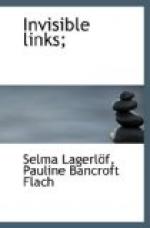“Does that help me if I go alone? For your sin, Death and all his spectres follow me. Do you not see how I shudder at you? You have lifted your hand against God himself. No crime is like yours. I think that I must rejoice when I see you on rack and wheel. It is well for him who can receive his punishment in this world and escapes the wrath to come. Why did you tell me of the just God? You compel me to betray you. Save me from that sin. Go to the priest.” And he fell on his knees before Berg.
The murderer laid his hand on his head and looked at him. He was measuring his sin against his friend’s anguish, and it grew big and terrible before his soul. He saw himself at variance with the Will which rules the world. Repentance entered his heart.
“Woe to me that I have done what I have done,” he said. “That which awaits me is too hard to meet voluntarily. If I give myself up to the priests, they will torture me for hours; they will roast me with slow fires. And is not this life of misery, which we lead in fear and want, penance enough? Have I not lost lands and home? Do I not live parted from friends and everything which makes a man’s happiness? What more is required?”
When he spoke so, Tord sprang up wild with terror. “Can you repent?” he cried. “Can my words move your heart? Then come instantly! How could I believe that! Let us escape! There is still time.”
Berg Rese sprang up, he too. “You have done it, then—”
“Yes, yes, yes! I have betrayed you! But come quickly! Come, as you can repent! They will let us go. We shall escape them!”
The murderer bent down to the floor, where the battle-axe of his ancestors lay at his feet. “You son of a thief!” he said, hissing out the words, “I have trusted you and loved you.”
But when Tord saw him bend for the axe, he knew that it was now a question of his own life. He snatched his own axe from his belt and struck at Berg before he had time to raise himself. The edge cut through the whistling air and sank in the bent head. Berg Rese fell head foremost to the floor, his body rolled after. Blood and brains spouted out, the axe fell from the wound. In the matted hair Tord saw a big, red, gaping hole from the blow of an axe.
The peasants came rushing in. They rejoiced and praised the deed.
“You will win by this,” they said to Tord.
Tord looked down at his hands as if he saw there the fetters with which he had been dragged forward to kill him he loved. They were forged from nothing. Of the rushes’ green light, of the play of the shadows, of the song of the storm, of the rustling of the leaves, of dreams were they created. And he said aloud: “God is great.”
But again the old thought came to him. He fell on his knees beside the body and put his arm under him head.
“Do him no harm,” he said. “He repents; he is going to the Holy Sepulchre. He is not dead, he is but a prisoner. We were just ready to go when he fell. The white monk did not want him to repent, but God, the God of justice, loves repentance.”




